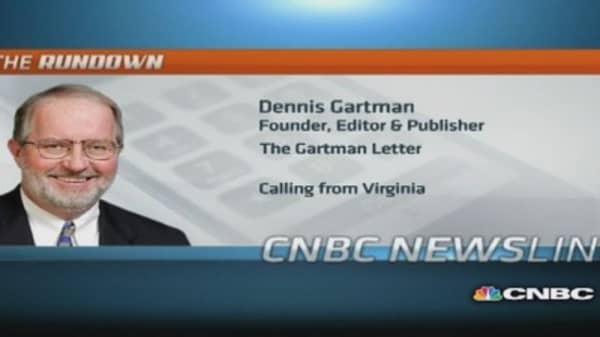And while you do that, you may wish to note that not even the developing economies (aka "emerging markets") are complaining anymore. They just love the Fed's largesse: Excess dollar supplies are coming in, and some of the big players (and erstwhile vocal Fed critics) in this group have no trouble at all financing their budget and current account deficits. Things are so good that they don't even think about the inevitable day of reckoning. They probably believe that it's still too far off, hoping that they will be able to grab a chair when the music stops.
Japan also likes to be in good company by following the Fed's example. It is apparently envisaging increased asset purchases to offset the depressive impact of the impending sales tax hike. After all, the yen would have to be pushed back down if stronger exports were to offset the likely weakening of consumer spending.
Meanwhile, the growing yen liquidity will also be fueling global asset markets.
Read More ECB to get drastic? QE could be on the table
The European Central Bank (ECB) is looking at all this from its splendid Frankfurt headquarters, openly worrying about the euro's strengthening exchange rate, but apparently thinking that the euro area's 0.3 percent money market rates are enough as it tries to clear up its credit channels.
And hence the question: How on earth could one be pessimistic about equity prices in an environment of so much money sloshing around the global economy? Especially since the world's finance officials, currently gathered for their big jamboree in Washington, D.C., want even more money to support growth, employment and financial markets. (I shall pick up later on the long-term implications of all that for investment strategy.)
The message from the monetary authorities is clear: Don't worry, enjoy the ride while it lasts.
Any problems of immediate concern?
Yes, plenty. How about close and hostile military encounters at sea and in the air, in-your-face military braggadocio, sanctions and countersanctions, deep freeze for a possibly gasless Europe, etc.?
Read More China oil leak poisons water for millions
As recently as yesterday (Saturday, April 12), three Chinese coast guard vessels entered what Japan considers its territorial waters around the disputed islands in the East China Sea. That is something Tokyo vowed not to tolerate. But China is routinely ignoring these warnings, continuing to challenge Japan's ownership of what Beijing says is part of its ancestral possessions.
The U.S. Defense Secretary Chuck Hagel got an earful on that during his last week's visit to China. His Chinese counterpart, General Chang Wanquan, told him in front of the rolling cameras: "I would like to reiterate that the territorial sovereignty issue is China's core interest … on this issue, we will make no compromise, no concessions and not even a tiny bit of violation is allowed." And to drive the point home, General Chang said that China was "ready to fight and win any battle."
That left Secretary Hagel no choice but to firmly reassure his Chinese host that the U.S. stood by its Asian allies.
It's easy to dismiss this as bluster and scare tactics – until, as the former U.S. Secretary of Defense Donald Rumsfeld used to say, the "stuff happens." For some strange reason, the Sino-Japanese military confrontation, involving the U.S., looks like a widely ignored reality, even though a shooting war seems to be a well-prepared "accident" waiting to happen anytime.
Read MoreRussia sets Ukraine aid terms as violence mounts
Ukraine is another case of military and economic tensions in the heart of Europe. Russia appears to have concluded that it was not in its interest to invade Ukraine, but anything might happen if Ukraine were to block, or temper with, the transit of Russian gas to Europe. At any rate, the Ukrainian drama will be playing out for a long time, keeping the European financial markets on edge as the U.S.-led NATO military alliance and Russia grapple for mutually acceptable security arrangements on an increasingly hostile and divided continent.
Investment thoughts
Gold is an obvious investment asset in an environment where China and Russia will continue to reassert their roles in a Western dominated world. Reserve asset diversifications will also underpin gold prices. And so will the avalanche of paper money as a harbinger of rising inflation expectations and actual price instabilities in the years to come.
The vigilance of long-term investors should perk up as world finance officials call from their Washington meeting for an even bigger monetary support of an already excessively liquid world economy.
But between now and the next two years, when inflation will most probably become a serious policy problem, the bull market will have some time to unfold on rising profits, driven by cyclically-induced productivity gains, and a benign market guidance of growth-seeking central banks.
Michael Ivanovitch is president of MSI Global, a New York-based economic research company. He also served as a senior economist at the OECD in Paris, international economist at the Federal Reserve Bank of New York and taught economics at Columbia.
Follow the author on Twitter @msiglobal9





